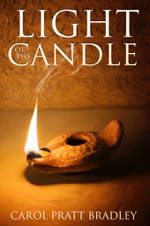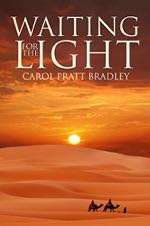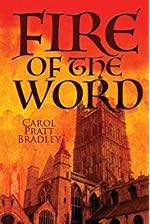by Carol Pratt Bradley
I have three published historical novels sitting on my bookshelf, another manuscript completed and another begun, with ideas for several more.
Interestingly, I find that at this stage of being a writer, many of the feelings that I had before becoming a published author still exist.
Vulnerability Renews Itself with Every Book Released
My heart is in my writing, and it makes me feel exposed.
After my first book was released, I just knew readers wouldn’t like it, and was kind of shocked as the positive reviews came in. I also had to realize that certain books connect with certain readers and my work will not resonate with everyone. And that’s okay.
But vulnerability does not go away after becoming a published author; it renews itself with every book released. And that’s okay, too.
I Have to Trust That My Words Are Good
It is believing in my own instincts that my words are good. Trusting that my books have meaning for others even if I never know.
Sometimes, though, I do hear. A reader posts a review, or I get a notice that one of my books made a list of top ten books read during the year. And then I realize that my words are out there and they are being read. And they have touched at least one other person’s heart.
I have to trust in that, even when I cannot see it.
I Have to Keep a Healthy Balance in My Day
Writing is private. It is done best in solitary confinement. So is reading. But anything done too much, is not mentally or physically healthy.
Since I quit my part time job, I have a lot more time to devote to writing, and to determine when I write and for how long. I usually spend my mornings researching and writing. But I have to keep a healthy balance in my day: incorporating exercise like yoga, nurturing relationships with family and friends.
Doing these rejuvenating activities strengthens my creativity. Even while driving in the car, a new way to look at the manuscript I’m working on will come to my mind. That’s why I take a pencil and notepad with me wherever I go, for an idea may only come once and then be gone.
Taking walks is rejuvenating and sharpens my senses, making me ready to write again.
Writing is My Attempt to Find Meaning in Seemingly Senseless Things
A certain voice nags inside my head: perhaps I should be doing better things with my time, get out of my house more, get a real job with steady money.
But then I return to the realization that writing is not just a pursuit that I do only for myself. It is not inherently selfish. It is sharing how I see the world and human nature.
It is developing empathy for others, and sensing what all people have in common across time and circumstances.
It is my attempt to find the meaning of seemingly senseless things.
Writing a Book Tests My Endurance
I struggle with patience. I want to be able to see the end of something when I am still at the beginning.
Writing a book tests my endurance. I must write it one thought, one word, one page, one chapter at a time. And when I finally have a full manuscript, revising until it feels complete.
Then I send it out, hoping/praying/anxious that it will be published, and that I will have another book with my name on it sitting on my shelf.
The only thing left to do is wait. No. It isn’t the only thing. I begin another book.
After Publishing Many Books, I Still Face Daunting Challenges
Feeling vulnerable. Reminding myself over and over to trust in my instincts. Pushing aside unnecessary guilt. Struggling to find balance. Waiting.
Yet, these things that still seem like daunting challenges also hold great rewards.
To feel vulnerable is a good thing, and also the need to periodically reassess my priorities. They bring the deep joy of searching deep inside myself, developing the discipline and the courage to write one word at a time until the story unfolding inside my imagination is complete.
All of this brings the deep joy of creating something that did not exist before, culminating in the never-ending awe as I hold another book with my name on it in my hands.
Read Carol’s previous post on Writing and Wellness here.
* * *
 Carol Pratt Bradley is a historical novelist with an MFA in Creative Writing. She has three published novels from WiDo Publishing and resides with her husband Bryan in Mapleton, Utah.
Carol Pratt Bradley is a historical novelist with an MFA in Creative Writing. She has three published novels from WiDo Publishing and resides with her husband Bryan in Mapleton, Utah.
Their three daughters and one son have grown and left their parents to survive on their own. They have a Yorkie named Ozzie, who sleeps beside Carol on the couch while she writes.
For more information on Carol and her writing, please see her website, or follow her on Pinterest or Twitter.
 Light of the Candle: As a young nobleman at the court of Jerusalem, Daniel’s life is one of privilege. His childhood friend, Sarai, is betrothed to him. Sarai’s future also stretches securely before her. She will marry the boy she loves and they will live together in their beloved homeland. B
Light of the Candle: As a young nobleman at the court of Jerusalem, Daniel’s life is one of privilege. His childhood friend, Sarai, is betrothed to him. Sarai’s future also stretches securely before her. She will marry the boy she loves and they will live together in their beloved homeland. B
ut outside the city gates waits Judah’s conqueror, Nebuchadnezzar, prince of Babylon, who demands a heavy price for peace. He takes treasures from the great temple of Jerusalem and hostages from among the promising young scholars, who will serve him in the court at Babylon. Daniel’s dreams are filled with strange images of things he has never seen. When Daniel’s father ensures that he is one of the young men selected, the dreams become frighteningly real. Sarai in Jerusalem and Daniel in Babylon will face the same challenge: to keep hope bright as darkness closes in.
Available at Amazon and Wido Publishing.
 Waiting for the Light: Three thousand Jews have been brought as hostages to Babylon, as King Nebuchadnezzar continues his subjugation of the land of Judah. Daniel, now governor of the province of Babylon, is in a position to aid his people as they resettle outside of the ancient city of Nippur.
Waiting for the Light: Three thousand Jews have been brought as hostages to Babylon, as King Nebuchadnezzar continues his subjugation of the land of Judah. Daniel, now governor of the province of Babylon, is in a position to aid his people as they resettle outside of the ancient city of Nippur.
Daniel and Sarai are briefly reunited after eight long years of separation, but obstacles remain before they can be together. Daniel must secure permission to marry from King Nebuchadnezzar, whose increasingly erratic behavior has Daniel fearing for the king’s sanity and for the safety of his people.
As the Jews strive to adjust and even prosper in the land of their enemies, their future remains uncertain. Daniel, in his position of power, moderates King Nebuchadnezzar’s erratic behavior toward the Jewish captives. But if he loses his position, the people will suffer.
Meanwhile, the young and foolish Jehoaichin, puppet-ruler back in Jerusalem, continues to defy the Babylonian king, whose patience toward the Jews is wearing thin.
Daniel and Sarai face a precarious future, both for themselves and their people.
Available at Amazon.
 Fire of the Word: Young English noblewoman, Anne Ayscough, lived during the turbulent times of Henry VIII, when Protestant reformist ideas clashed violently against entrenched Catholicism.
Fire of the Word: Young English noblewoman, Anne Ayscough, lived during the turbulent times of Henry VIII, when Protestant reformist ideas clashed violently against entrenched Catholicism.
Yet many, especially the wealthy, owned William Tyndale’s New Testament, including the household of Sir William Ayscough in Lincolnshire. In her family home, Anne grew in an atmosphere of openness, gleaning new ideas from her brothers who were educated at Cambridge, a hotbed of Protestant ideals.
At the age of fifteen, Anne’s life changed drastically. Her older sister Martha, betrothed to a son of a family staunch in the Catholic faith, contracted a fever and died. With the financial arrangements for the marriage already in place, Anne’s father ordered her to stand for her dead sister, forcing his daughter to enter a loveless marriage.
England’s religious war became Anne’s as she clung tight to her own ideals in her husband’s house. This eventually brought her into the center of the vicious political and religious battles where she was faced with a choice.
Anne could deny the truths she had embraced as a young woman and live, or hold fast to her beliefs and be put to death.
Available at Amazon.

